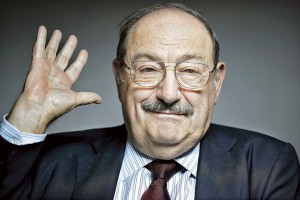Umberto Eco’s contribution to PR thinking
About the author
Our guest authors are what make PR Place such a vibrant hub of information, exploration and learning.

An article by Miriam Pelusi
Celebrating the life of Italian academic and writer Umberto Eco means valuing his kaleidescopic achievements.
As a many-sided intellectual he turned his attention to many different topics including PR, media, culture and communication.
He offered up the key of our me-media era: the idea of a mobile and interconnected culture for everyone.
In 1993 Eco founded the Institute of Communications Disciplines in Bologna, the oldest university in Europe. Yet his contribution to the PR field is not widely recognised. I will argue that his views profoundly shaped new perspectives in PR.
Profound ideas widen PR vision
Eco embraced the digital revolution. He anticipated the spirit of a new people by applying the botanic metaphor of rhizome to mass communications.
This is the beginning of a participatory consciousness at the grassroots. It represents a turning point: from a hierarchical control system to an harmonious cooperation model. The challenge of this decade is moving from an uncentered liquid modernity to a centered fluid community.
A community is a circle, not an elitist triangle. Everybody is somebody. Everyone is a shore and a centre, building each other up. This is a radical change of direction.
The paradox of postmodernism is globalisation. It produces individualism, relativism and consumerism while collaboration occurs in a fluid community. Glocalisation generates oneness, solidarity and produsage.
This best-selling author engages people in an ever-changing scenario by dialoguing. His dialogues are a narrative with his audience, as they were for Aristotle. In 1979 with “Lector in fabula”, he theorised the interpretative cooperation between author and reader. Messages have multiple possible interpretations.
Eco cultivates relationships with anyone: his work is an open text. This internationally renowned intellectual intuited that building a direct and warm relationship with his reader is an act of freedom and immortality.
His research is connected to PR theories and practice. He argued that PR is not only a business discipline, reduced to a merchandising function of marketing. This misrepresentation denaturalises PR by distorting its nature and real value.
Within Eco’s framework, we take a panoramic view on PR history and rediscover its philosophical origins. PR’s roots are in the ancient Greek rhetoric – making an argument requires empathy and persuasion. By bringing back the essence of PR, we recognise it as an art by shattering the myth of PR as a science.
This historical background also challenges PR measurement theories. ROI models are limited to a financial accountability and reduce PR to a monetary consumer experience. By contrast, qualitative measures raise the value of PR. The shift affects whether people perceive PR as useful to society.
Eco’s method in semiotics is a precious legacy to PR research. Signs are a shared code of expression. Any communications lies in a symbology, as a means of exploring and naming the ineffable. PR as a language is a unifying symbolic creation.
Timesaving PR lessons
Umberto Eco’s golden rule is simplicity: making complex ideas concrete. His legacy includes three intertwined PR techniques: brevity, creativity and humour.
He valued brevity as an intellectual responsibility. In PR less is more. Designing a logo, writing a press release is like a maths exercise: a reducing practice to find the essential.
The idea of a combinatorial creativity is bohemian. PR is an aesthetically pleasant art. A PR professional trawls widely to craft feel-good stories.
Humour is a simple pleasure of life, but also a PR technique. It creates an intimate communication on a large scale. The best PR campaigns create amusement, enjoyment, and reflection. PR positively shapes a new reality.
Finally, the art of making lists to concentrate efforts. In PR management lists help develop consistency and flexible planning. Lists strategise PR actions: identifying problems, turning them into solvable issues, and identifying who is responsible for what.
Memory as antidote to ‘soft’ propaganda
In 1997, Eco’s essay “Towards a semiological guerrilla warfare” argued that “information has itself become the chief merchandise”. Eco denounced modern soft dictatorships, particularly the Italian one. The Italian conflict of interests paralyses information. Paradoxically ignorance counterbalances culture.
Soft manipulation is the real effect on public imagery. PR is associated with propaganda; it has an instrumental relationship with political control and economic power.
Persuasion becomes a brainwashing technique. Since its arrival, TV has profoundly influenced Italian society by transforming mass media culture into a relaxing commodity and an object of consumption. By producing a seductive meta-narrative, the commercial and political elites take control of messages, both their meaning and potential interpretation. On a corporate level, lobbies become the main stakeholders.
Freedom of expression is an egalitarian right. Through Numero Zero, he accused the mud-machine: a suspicion that muddies another person or organisation. During the Inquisition, delegitimizing others through insinuation was common. Low-cost techniques such as conspiracy, insults and gossip generate fear.
The recovery of a past consciousness in a fast-paced digital era, values Eco’s legacy. As he said “if there is something that we call soul, that’s memory – it makes up your identity”.